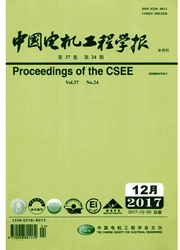

 中文摘要:
中文摘要:
针对由风电场出力变动对互联电力系统造成的频率偏差和联络线功率偏差问题,基于线性二次型软抑制微分博弈理论,对含有多电源区域电力系统的负荷频率控制进行了研究。在充分考虑区域内各发电机组的利益与运行特性差异的前提下,通过对目标函数权重矩阵的选取,设计了系统中各发电机组的非合作反馈纳什均衡控制策略。仿真结果表明,与采用不考虑扰动的微分博弈理论和最优控制理论设计的控制策略相比,软抑制微分博弈理论能够在实现系统控制目标的情况下,充分利用各发电机组的特性,平衡各发电机组的利益,同时控制策略对系统出现的外部扰动及内部机组参数变动具有较好鲁棒性。
 英文摘要:
英文摘要:
To deal with the deviations of frequency and tie-line power of interconnected power systems caused by variation of wind farms output, this paper applied linear quadratic soft-constrained differential games theory to load frequency control of area power system which contains multi-source power generation units. With fully considering the differences of interests and operation characteristics among generation units in the same area, the non-cooperative feedback Nash equilibrium control strategies used by different kinds of generation units are designed based on appropriate selections of weighting matrices in objective functions. Simulation results show that comparing with the control strategies designed by differential games theory without considering disturbance and optimal control theory, soft-constrained differential games theory can accomplish system control targets, make full use of characteristics of different generation units, and balance the interests of them. At the meantime, the control strategies show better robustness against system disturbance and variations of units' parameters.
 同期刊论文项目
同期刊论文项目
 同项目期刊论文
同项目期刊论文
 A phase synchronization control scheme for LCL-T type high-frequency current source in parallel conn
A phase synchronization control scheme for LCL-T type high-frequency current source in parallel conn 期刊信息
期刊信息
